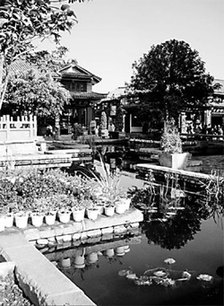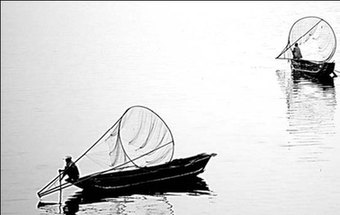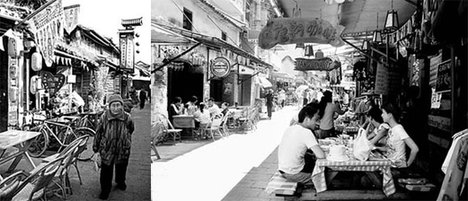Catching sight of my acrophobic younger sister beside me, ashen-faced with eyes clamped shut against the world, I threw my own petrified state into sharp relief. Like her, I had stubbornly ignored the coaxing drawl of our local guide as we lurched around the curves of this magnificent mountain in Southwest China's Yunnan province.
A street garden in Dali's old town.
"Look, it's beautiful, isn't it? Beauuuutiful," the guide said over and over, turning from the relative comfort of the front seat to encourage the unappreciative tourists behind her.
But the blackened view from behind our eyelids seemed preferable to gauging exactly how far above sea level we were, even if it meant missing whatever scenes were keeping her so enthralled.
I'd kept a white-knuckled grip on my seat to stop from banging my head against the roof of the knockabout van as we bounced around on an impossibly narrow track hewn into the side of the mountain.
But hearing my sister's stifled whimpers, I steeled myself in an effort to prove our fears irrational and gazed down cautiously. Dramatically terraced fields and tiny villages unfolded far below, a steep tableau as wonderful as it was terrifying.
It was a Christmas Day like no other, far removed from our usual December celebrations, which were spent seaside on the other side of the world. We had booked a minibus that took us from the gorgeous old town of Lijiang towards the perennially snow-capped peak of Jade Dragon Snow Mountain, located nearly 6,000 m above sea level.
The day's spectacular - if nerve-wracking - tour concluded the first leg of our Yunnan holiday. Returning after dark to our guesthouse, we arranged for the same minibus to shuttle us to Dali the next morning, quickly forgetting any misgivings over the driver's earlier handling of those startling mountain bends.
Two fishermen are working on Erhai Lake.
Without the company of our verbose guide, the trip to Dali was a subdued affair. The driver hailed from a nearby Naxi minority village and looked no older than 15. He spoke no English and scant Mandarin and had a penchant for riding the brakes as we coasted in seeming freefall when the road was in descent. A few hours and 200 km later, we mercifully arrived at our destination.
Dali sits at an altitude of around 2,000 m, about 500 m lower than Lijiang, and is an ideal place to relax while recovering from the seeping fatigue characteristic of altitude sickness. The town is surrounded by ancient city walls and blessed by the blue-gray backdrop of Cangshan Mountain, lying at the southern foot of the Henduan Shan mountain range, and Erhai Lake, described in a 2001 submission to UNESCO as, "bright and beautiful as a mirror". Both sites have been granted World Heritage list status, with the 960 sq km scenic spot encompassing Dali commended for its, "wonderful natural scenery, long-standing history and culture, numerous historical relics and sites and strong national custom".
While today the old town is a backpacker's haven, loved for its laidback vibe and ample cafes serving up decent coffee and sandwiches, it boasts a rich history that has earned Dali its alternative identity as former capital of the five kingdoms. With signs of human habitation dating to the Neolithic Age, Dali has, at various stages through history, served as the capital of the Nanzhao, Dali, Dachanghe, Datianxing and Dayining Kingdoms.
According to UNESCO documents, travelers in search of the area's past significance can find more than 100 historical relics and sites, including the Dehua Tablet and Shibaoshan Grottoes, both dating to the Nanzhao Kingdom (738-902), as well as the Chongshengsi Three Pagodas.
But we were not so intrepidly inclined, instead preferring to explore the more modern attractions - cozy cafes and colorful handicraft stores - lying within the city walls.
Left: An old woman strolls in an old lane in Dali's old town. Viva Goldner Right: Visitors enjoy food and coffee in one of Dali's bar streets.
First, though, we checked into Jim's Tibetan Hotel, a clean and spacious establishment decorated in colorful Tibetan style, with framed photographs from the plateau, bright prayer flags and fabric lanterns. Our suite slept four, with handsome traditional Chinese wooden furniture and ethnic designs in blue painted on the ceiling. The bathroom was new, with ready hot water and a heating lamp - definitely appreciated when the mercury plunged at night. Downstairs was the caf, serving a delicious set breakfast and a good selection of Western food as well as specialties, including yak meat goulash.
The lovely architecture of the Bai - Dali's most prominent minority group - lends the streets colorful character, with delicate scenes of birds and flowers painted on the white walls of buildings with flared eaves. Blue is the dominant color of decoration, extending to the traditional costumes still worn by many Bai people, who settled in the region some 3,000 years ago and today number about 1.5 million.
The old town is laid out in a grid between the ornate south and north city gates and centered on a wide pedestrian boulevard bordered by water canals. The streets are lined with stores selling local handicrafts, such as bright blue-and-white Bai batik, silver jewelry, and vases or ashtrays carved from smooth marble in an array of smoky and jewel tones, originally quarried by the Yi minority.
Street vendors sell local snacks such as rushan, a crispy, fried cheese served on skewers, while juicy citrus fruits and sweet strawberries are sold from baskets slung across the shoulders of old women.
For something substantial, try the provincial specialty, Crossing the Bridge Noodles, a large bowl of steaming broth brought to the table with plates of rice noodles and various other ingredients that are mixed into a flavorsome, spicy stew.
We dined in one of several restaurants displaying fresh vegetables and seafood in baskets and tanks on their front steps, selecting tiny clams caught from the lake, leafy greens, eggplant and some funky-looking fungus. We heard a splash and turned to see a plump fish leaping from his tank, as if determined to be part of our dinner.
So in he went with the rest, emerging from the kitchen soon after as part of a homestyle Chinese feast, with rice, soup and various braised dishes.
Pleasantly stuffed, we headed for the international strip of Huguo Lane off Fuxing Road, where clusters of cafes compete to offer the most inviting atmosphere and comforting fare, from the three-course Bai tea ceremony at Mr Li's Caf to the pizza joint opposite touting, "China's most pimped out pizza".
It's hard to pass the Sweet Tooth Caf's window display of calorie-laden delights. Harder still is choosing from treats including cheesecake, Snickers slice and Oreo cream pie. The caf, on Boai Road, is owned and operated by a local deaf charity that also arranges massages - ideal for banishing any remaining stress from scaling mountain heights.
(China Daily February 18, 2008)




